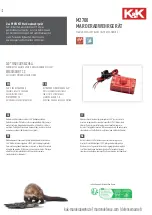
Chapter 30: Unified Electronic Surveillance
STANDARD Revision 1.0
C4® CMTS Release 8.3 User Guide
© 2016 ARRIS Enterprises LLC. All Rights Reserved.
877
The Call Content Connection Identifier (CCC-ID).
Note: The IP addresses used with the CALEA feature are all IPv4.
The CCC-ID is used by the Delivery Function to uniquely identify the packets associated with this particular media stream
(this attribute is present beginning with PKT-SP-ESP-I02).
The C4/c CMTS dynamically determines the electronic surveillance version from the syntax of the electronic surveillance
object sent to the C4/c CMTS from the CMS. The C4/c CMTS can be connected to multiple CMSs, each of which might
support a different version of electronic surveillance. The C4/c CMTS forwards surveillance information in a format
compliant with the version related to the surveillance request in question. Therefore, the network should be configured
such that the Delivery Function associated with a surveillance request should be compatible with the version requested by
the CMS.
Per Electronic Surveillance specification assumptions, the C4 CMTS supports a maximum number of intercepts of 5% of its
active calls.
Electronic Surveillance Configuration
Event Messaging must be configured on the C4/c CMTS in order to enable the forwarding of the duplicated event
messages to the Delivery Function. This is in keeping with the PacketCable specification, since a C4/c CMTS Element ID is
required for the event messages that are forwarded to the Delivery Function. For more details see
829). Note that the retry limit and the retry timer as configured for Event Messaging also apply to the event messages that
are sent to the Delivery Function.
If a Record Keeping Server (RKS) is not being deployed within the PacketCable network being configured, the following
command can be entered to turn off billing on the C4/c CMTS:
configure packetcable eventmsg no billing-events
This allows the event messages to be forwarded to the Delivery Function without sending event messages to a non-
existent RKS. No provisioning is required on the C4/c CMTS to enable CALEA Call Content.
Electronic Surveillance Logging Messages
The C4/c CMTS prints "info" level log messages when a request for CALEA Call Data or CALEA Call Content, respectively, is
received from the CMS. Note that the info level debugging must be enabled to view by entering:
















































